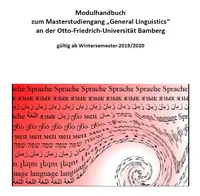Structure and content
Degree programme curriculum
Modular structure
The master's programme in General Linguistics consists in a range of modules each of which has - at least in most cases - two component parts. Students will complete and gain ECTS credits for each component part.
The program consists of core modules, elective modules, language modules and the preparation of the Master's thesis. A total of 120 ECTS points must be achieved: 40 ECTS points for the core modules, 30 ECTS points for elective modules, 20 ECTS points for the language modules and 30 ECTS points for the preparation of the Master's thesis.

Recommended courses for the elective modules (‚Erweiterungsbereich‘) in the MA General Linguistics
This list (47.0 KB, 3 pages)contains a selection of courses that could be chosen for your elective modules. If you have any questions regarding your choices for electives, or if you would like to choose a course that is not on this list, please contact the student advisors for guidance.
Language courses are an integral part of the MA program. International students may gain credits for the language modules from German courses, acquiring the local language at the same time.

Programme content
Short description
The Bamberg programme in General Linguistics is a focussed on the systemic aspects of language and linguistics, in particular the areas of grammar, language variation and change, linguistic diversity and the methodological foundations of language sciences. The Module handbook for MA programme General Linguistics (in German)provides more detailed information on the structure of the MA programme General Linguistics, its different modules and their specific content.
Description of individual modules
Core modules 40 ECTS points
The following set of core modules are mandatory for all students in the MA programme:
- Master module M1: Description and analysis of linguistic systems (8 ECTS)
Master module M2: Language Variation and Change (8 ECTS)
Master module M3: Linguistic diversity (8 ECTS)
Mastermodule M4: Linguistic research methods (8 ECTS)
Research module M5: Master's thesis colloquium (8 ECTS)
The overall focus of this core area of study is to familiarise students with key aspects of empirical linguistics, including language documentation, linguistic typology and areal linguistics.
Elective modules 30 ECTS points
Elective modules may in principle be chosen from any BA and MA degree programme offered at the University of Bamberg. In practice students have to check in advance if they meet the relevant prerequisites for the courses they like to take. Students have to take elective modules worth 30 ECTS points in total.
Language modules 20 ECTS points
The acquisition of foreign languages is a further integral part of the MA programme. A wide range of language courses is offered in the form of modules at the Sprachenzentrum (language learning center) of the University of Bamberg, but not all are available for this programme, and the range of courses offered may change at short notice. Students are therefore obliged to consult the student counselling before deciding which language modules to take. Students with a first language other than German can also choose "German as a foreign language" (DAF) within this module area.
Master’s Thesis 30 ECTS points
The preparation of the Master's thesis begins at the earliest after the end of the 2nd semester. The processing time for the Master's thesis is six months.